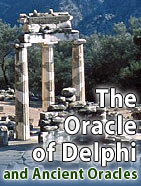
Popular
Popular reference | New age and pagan
Popular reference
The Classics Pages: Oracles by Andrew Wilson, including a good medium-sized list of 5-4c. oracles. Wilson is the translator of Harry Potter into Ancient Greek, and author of a hysterical page, the benefits of a classical education, on successful people with classics degrees (eg., the lead singer of Coldplay, who also—and better in my mind—dates Gwyneth Paltrow).
 Amazon. The Oracles of the Ancient World: A Comprehensive Guide by Trevor Curnow, Lecturer in Religion at St. Martin's College, Lancaster (April 2004). An alphabetical dictionary of some 300 oracles in 25 countries.
This book has not yet received any reviews online. I'm pitching to get a review copy myself.
Amazon. The Oracles of the Ancient World: A Comprehensive Guide by Trevor Curnow, Lecturer in Religion at St. Martin's College, Lancaster (April 2004). An alphabetical dictionary of some 300 oracles in 25 countries.
This book has not yet received any reviews online. I'm pitching to get a review copy myself.
Ancient Greek Oracles, a short fact-oriented popular introduction from Archaeonia, an online magazine/encyclopedia of the Greek world by Christos Thomas Vlamis. Vlamis' text is admirably hyperlinked to other sections of the site, but he goes overboard on boldface phrases. Related entries include Apollo.
Encyclopedia Mythica: Oracle by George Hager. Basic.
"Oracles, seers, and prophets in Greek tragedy" by Jonathan, for an AP English class. Uncontroversial thesis: oracles foreshadow.
The history of divination by "the editor of Heretic Press" (not, apparently Patrick Hanrahan). Lengthy grab-bag of true and false information[1], "Jesus Hoax" arguments, splenetic attacks on "the inner esoteric circle of mental masturbaters who think they are better than others," etc.
Wikipedia Hall of Shame:
- Wikipedia: Delphic Oracle currently redirects to Sibyl. This is Wikipedia at its worst. The entry is a fantastic blend of 19c. scholarship and modern religious fantasy, disconnected from contemporary classical scholarship. The writers' efforts to gloss over Apollo's role at Delphi is not to be believed. This is everything that is wrong with Wikipedia: a handful of modern "pagans" can shanghai a page. Since pagans outnumber people with Classics degrees (particularly on Wikipedia), the pagans' view of truth wins.
- Wikipedia: Oracle. Better.
- Wikipedia: Dodona. Similar mother-goddess problems.[2]
- Python (mythology). Outdated speculation treated as fact.
"Pythons and Prophecies..." by Joanna Lehmann, from the Fortean Times, "The World of Strange Phenomena." Another detailed, readable, semi-scholarly account, decked out with bibliography and footnotes that is, at the same time, very speculative, even fantastic.
New age and pagan
The Church of The Most High Goddess. Modern pagans with a lot to say about oracles. This is a rather typical melange of authentic facts demonstrating wide reading, autodidac methodology, and hillarious philological and historical gaffes.
 Amazon. Have You Been to Delphi? : Tales of the Ancient Oracle for Modern Minds by Roger Lipsey, "retells and reinterprets tales from ancient literature." Includes an afterward, quizzing a Tibetan lama about the Tibetan state oracle.
Amazon. Have You Been to Delphi? : Tales of the Ancient Oracle for Modern Minds by Roger Lipsey, "retells and reinterprets tales from ancient literature." Includes an afterward, quizzing a Tibetan lama about the Tibetan state oracle.
Notes:
- The author took offense at reference to "false information," so here are a few choice examples:
- The "closing of the oracles" is attributed to Contantine ("about 300 A.D"). This is too early. The emperor Julian engineered an oracular revival, and they were not finally banned until Theodosius.
- The author swallows that the Sibylline oracles were completed before the Common Era and this date is then used to attack Christianity for its "marketing ploy" in apeing them. In fact, the "marketing ploy" (a rather unsophisticated way of understanding this sort of literature) is quite the reverse: the oracles were completed after the rise of Christianity.
- Oracular divination is reduced to the action of "Sybils," and include the responses given to Croesus and Socrates. In fact, there were no oracular consultations in historic times. Sibyls were always presented as figures of the distant past. Furthermore, the "role" of Sibyls grew over time; our first references (Heraclitus) presumed a single prophetess, but numbers increased in later periods. The "Delphic Sibyl" is a particularly late invention.
- Homer is described as "through whom we know of legends of ... Atlantis."
- The author believes (and presents as simple fact) that oracles employed an international system of trained doves and swallows to fool people into believing they predicted events before human news could arive.
- It's nice to see the
Wikipedia article on the Mother Goddess includes both sides:
" it is sometimes too facile to class all archaic female goddesses as manifestations of the Mother Goddess. Archaeologists tend to avoid such theories in interpreting sites and material remains, and sometimes denigrate them as inspired more by radical feminism than strict archaeology."
(back)

All material © 2000–2005 Tim Spalding. Books presented in association with Amazon.com.
If you enjoy this site you may like this other site by me:
Ancient Astrology and Divination. Annotated guide to over 200 sites about Greco-Roman divination. (This site is a spin-off from it.)
The Wiki Classical Dictionary. New project includes a category for divination and oracles.